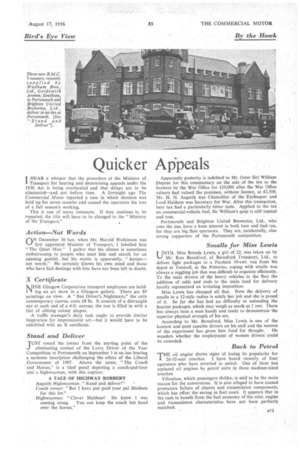Quicker Appeals
Page 57

If you've noticed an error in this article please click here to report it so we can fix it.
I HEAR a whisper that the procedure at the Ministry of Transport for hearing and determining appeals under the 1930 Act is being overhauled and that delays are to be eliminated—and not before time. A fortnight ago The Commercial Motor reported a case in which decision was held up for seven months arid caused the operators the loss of a full season's working.
This is one of many instances. If they continue to be repeated, the title will have to be changed to the "Ministry of No Transport."
Action—Not Words
ON December 30 -last, when Mr. Harold Watkinson was first appointed Minister of Transport, I labelled him "The Quiet Man." I gather that his silence is sometimes embarrassing to people who meet him and search for an opening gambit, .but . his motto is apparently, "Action— not words." He certainly knows his own mind and those who have had dealings with him have not been left in doubt.
X Certificate
MINE Glasgow Corporation transport employees are hold ing an art show in a Glasgow gallery. There are 85 paintings on view. A "Bus Driver's Nightmare," the only contemporary canvas, costs £8 8s. It consists of a distraught eye at each end of a 4-ft. canvas; the rest is filled in with a riot of oblong colour shapes.
A traffic manager's daily task ought to provide similar inspiration for impressionist art—but it would have to be exhibited with an X certificate.
Stand and Deliver
TUT round the corner from the starting point of the eliminating contest of the Lorry Driver of the Year Competition at Portsmouth on September 1 is an inn bearing a sardonic inscription challenging the ethics of the Liberal Government of 1907. Above the name, "The Coach and Horses," is a tiled panel depicting a coach-and-four and a highwayman, with this caption: A TALE OF HIGHWAY ROBBERY Asquith Highwayman: "Stand and deliver!" Coach owner: "But I have just paid your pal Haldane for this lot."
Highwayman: "Clever Haldane! He knew I was coming along. You can keep the coach but hand over the horses." Apparently posterity is indebted to Mr. (later Sir) William Dupree for this commentary on the sale of the inn to the brewers by the War Office for Z10,000 after the War Office valuers had valued the premises, without licence, at £2,500. Mr. H. H. Asquith was Chancellor of the Exchequer and Lord Haldane was Secretary for War. After this transaction, beer tax had a particularly bitter taste. Applied to the tax on commercial-vehicle fuel, Sir William's quip is still topical and true.
Portsmouth and Brighton United Breweries, Ltd., who own the inn; have a keen interest in both beer and fuel tax, for they are big fleet operators. They are, incidentally, also strong supporters of the Portsmouth competition.
Smalls for Miss Lewis
UNTIL Miss Brenda Lewis, a girl of 22, was taken on by 4*–/ Mr. Ken Beresford, of Beresford. Transport, Ltd., to deliver light packages in a •FordsOrt 10-cwt. van from his depot at Tunstall, in the Potteries, coping with smalls was always a niggling job that was difficult to organize efficiently. To the male drivers of the heavy vehicles in the fleet the addition of odds and ends to the main load for delivery locally represented an irritating imposition.
Miss Lewis has changed all that. Now the delivery of smalls in a 12-mile radius is solely her job and she is proud of it. So far she has had no difficulty in unloading the heavier packages, which may weigh as much as 1 cwt. There has always been a man handy and ready to demonstrate the superior physical strength of his sex. According to Mr. Beresford, Miss Lewis is one of the keenest and most capable drivers on his staff and the success of the experiment has given him food for thought. He wonders whether the employment of women drivers' could be extended.
Back to Petrol
THE oil engine shows signs of losing its popularity for
26-32-seat coaches. I have heard recently of four operators who have reverted to petrol. One of them has replaced oil engines by petrol units in three medium-sized coaches. Vibration, which passengers dislike, is said to be the main reason for the conversions. It is also alleged to have caused premature failure of chassis and transmission components, which has offset the saving in fuel costs. It appears that in the rush to benefit from the fuel economy of the oiler, engine and transmission characteristics have not been perfectly matched. B73




































































































